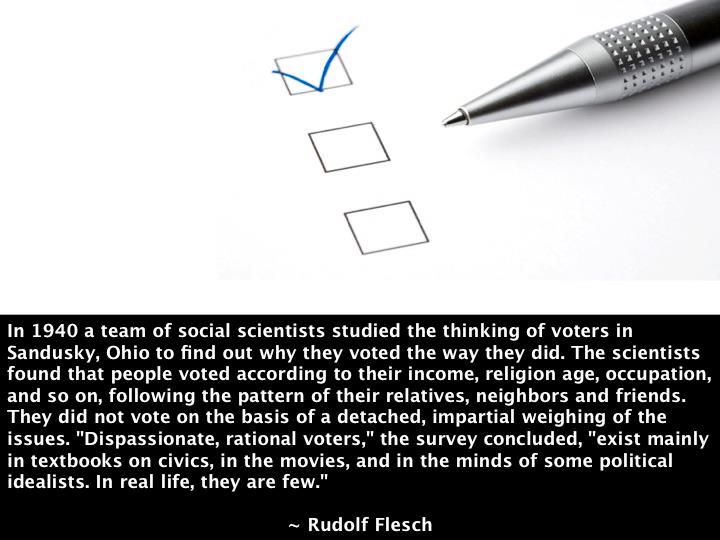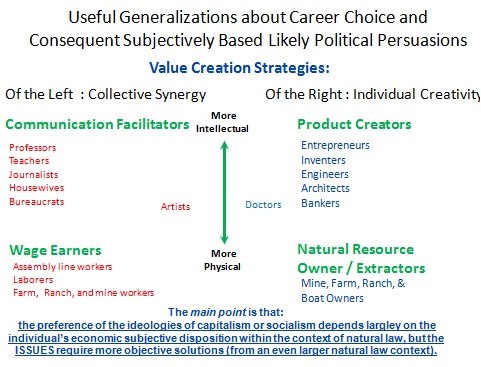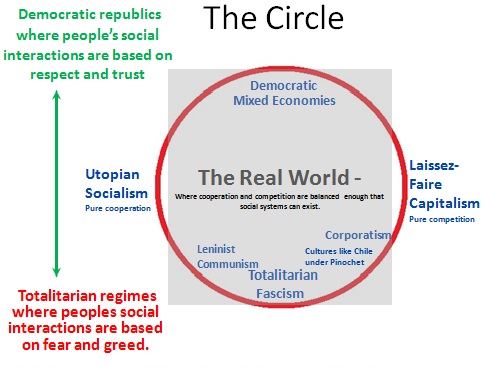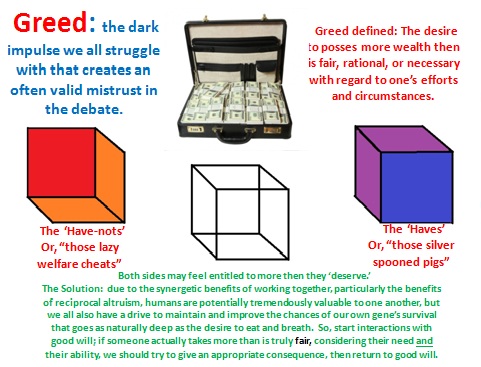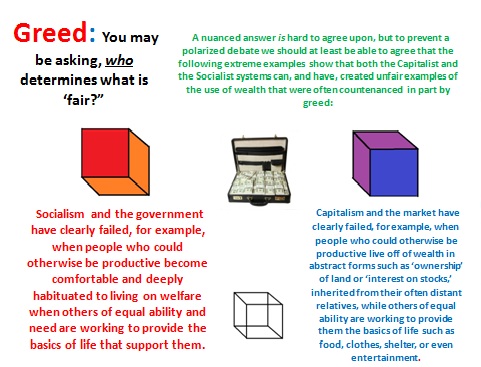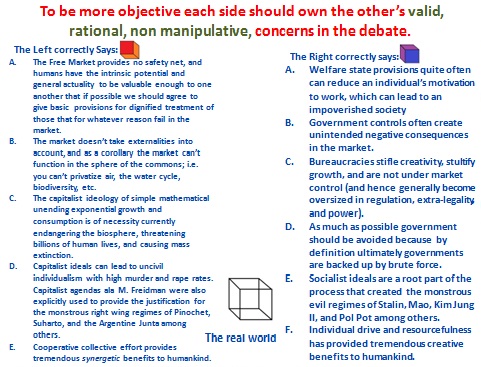 5. Socialism versus Capitalism
5. Socialism versus Capitalism

Marx & Rand
Video script(s):
2/25/2019
The key thing that is going on in the capitalism versus socialism is something that, amazingly, has never really been talked about: creativity versus synegy. These two concepts, creativity and sysnegy are at the very root of the debate, but why haven’t you heard that they are at the root?
It takes a little explaining. . .
Have you ever wondered why we humans can’t get more traction with resolving the Capitalism versus socialism debate? Consider that very intelligent, educated, and well meaning people have weighed in, on both sides, on this debate, over and over, and over. It’s been at least two hundred years. A lot of history has unfolded. And yet the debate rages on. Yes, certainly, there have been deeply evil and/or ignorant and foolish people on each side, but there have also been rather noble, educated, and wise partisans.
Although, if you yourself are an impassioned partisan, then of course you are likely to dispute the wisdom and decency of the opposition. (<<during these opening sentences show pictures of wise and intelligent partisans).
But surely we agree that progress has been made in the hard sciences (shows pics progressing from Galileo to Einstien), and yet there has been a lot more passion and energy directed towards economics. Heck, wars have been fought over economics, not over physics. So why can’t all this human passion over economic theories lead to some sort of progress??
Well. . . to begin with . . . obviously economic theories have a prescriptive element to them, unlike, say, physics which is merely descriptive. Another way to put it is that it is probably easier for us humans to agree about what is the case than about what ought to be the case.
But still . . . if that is the problem, then why can’t we boil down our differences in the capitalism versus socialism debate, down to where we just disagree about the oughts (the prescriptive elements), and really hammer that out, really stick with discussing those core disagreements, until we find common ground?
Which leads us to . . . Freedom versus equality. How many times have you heard champions of capitalism go on about freedom, and the free market? Surely it’s been roughly the same amount of time that you’ve hear champions of socialism talk about equality. Aren’t these the two oughts? The two core emotional drivers, that lead in differing directions as to which economic direction we ought to be heading? And if so, why these two concepts? If for a moment, you can give partisons the benefit of the doubt, that on both sides the partisans are well meaning, intelligent , and educated? Why hasn’t there been more resolution between the freedom fighters and the equality fighters?
Democracy versus totalitarianism.
2/23/2019
Why can’t we humans really figure this damned 200 year old socialism versus capitalism debate out!? Why can’t we just get over it! My background is in physics, and in 200 years in physics humans have made a ton of progress!
Hell, each side in the capitalism versus socialism debate claims they are appealing to reality, to the way things are. Physicists also appeal to reality. So what’s the difference? And how can we get progress in our common understanding of economics such that new economics theories actually are built on the SUCCESS of old theories, in the same way that Einstein’s theories were built on the success of Newton’s.
Well, you could say that physics is a hard science and that economics is a soft science. That physics is easier for us humans because it just describes the way things are, and economics has to do that, but it also has to prescribe the way things ought to be. Capitalist say we ought to prioritize freedom for government control. And socialist say we ought to care about humans being treated equally. But even then, to resolve this debate we must appeal to facts about the larger reality as to which one of these is more important. Or maybe neither is more important. Maybe we need to look at what is continually causing people to line up and become partisans for one or the other value: freedom or equality.
But before we do that, let’s do our very best to drop the attitude that one side or the other is simply evil (as in greedy or lazy or power hungry), or that the other side is stupid. Let’s own that very good and very intelligent people have been partisans on both sides. Einstein himself and Naom Chomsky, for example, are both obviously intelligent examples of people of great integrity who were or are socialist partisans. And Frederick Hyak and Milton freedman were also highly intelligent, honest, and earnest partisans for capitalism.
My background is in Physics, and so it is from that perspective that I have to wonder: why has the capitalism versus socialism debate been so intractable? After all, both “sides” in the debate are claiming to appeal to nature or human nature to make their case for the way reality works. That is surely the root justification that the Socialist and the capitalist are claiming to appeal to. True, there are emotional drivers such as “freedom” or “Equality” that are also appealed to. But when asked why freedom or equality matters, ideological partisans from either side will still try to appeal to reality on some deep level as to why freedom or equality should be important. So the question remains, “why can’t we humans do a better job of figuring this one out?” Newton made profound progress in understanding the physical world as a whole. Einstein then took that to the next level. And contemporary physicists are progressively taking our understanding of reality as a whole to yet another level.
And yet for the general populace, despite endless wrangling and a lot historical experimentation, if seems like socialists and capitalists have largely just debated in circles for 2 hundred years.
This page is also still under construction (I am not done editing and condensing it.
Hopefully the pending PowerPoint videos will have the power to untie the Gordian Knot that has caused the irrational polarized debate at the heart of most of human politics for at least the last two hundred years. Watch it. Understand just how important this PowerPoint may be for cutting through 99.9% of the rhetoric on both sides. Then please, GO FORTH and share it, and spread the word! (three videos are pending!)
Initial script:
Is the polarized and intractable nature of most current political debates frustrating to you?
It does not have to continue this way. The vast majority of humanity is fully capable of conducting its political affairs more consciously and reasonably then is occurring now.
Let us help humanity move forward towards graceful sustainability instead of impending ugliness and collapse.
(Consider also that when only issues have been discussed, without attempts to go deeper and resolve the values behind core ideologies, polarization has occurred to the point where those on ether pole are so educated regarding the ‘issues’ that you get such curious phenomena as the backfire effect where if the opposition proves a lie has been told by ‘your’ side you become even more prone to believing the lie . . . )
Some new ideas need to be brought into the zeitgeist:
Thesis #1: For all of the energy that has been put into the Capitalism versus Socialism debate, virtually no one has precisely articulated the irrationally subjective nature of the main underlying motives of both sides. When that is done clearly and honestly it becomes very obvious that neither side’s position is inherently ethically superior. And it is obvious that the reason this debate is so intractable is that both sides (or ideologies) are subjectively blinded by self interest to what is the reasonable path forward. So let’s articulate what is really going on:
Thesis #2: Capitalist idealism equals subjective belief in facilitating individual creativity as a primary value. The ideal of maximizing individual creativity in this context can arise, not just from the individual with the ideology’s subjective sense of their rights to the benefits of their own creative abilities; It can arise from the individual’s subjective sense of how their community, and or simply their family via their ancestors, became or can become, more wealthy (see chart below).
(show pics)
Thesis#3: Socialist idealism equals subjective belief in facilitating cooperative synergy as a primary value. The ideal of maximizing cooperative synergy in this context can arise, not just from the individual with the ideology’s subjective sense of their rights to the benefits of cooperative synergy via their participation or intended participation in the economy; It can arise from the individual’s subjective sense of how their community, and or simply their family via their ancestors, became or can become, more wealthy (see chart above).
(show pics)
?? Maybe here I should have Tao pic (call it ‘Subjective Origins’)??
?? Talk about examples of individual creativity.>all evolutionary adaptions, the wheel. fire, Henry Ford, Thomas Edison, Bill Gates, Mark Zuckerburg,>>
Reasonable demands for enabling individual creativity:
a. Individual creativity: Reward it;from each according to his ability to each according to his ability (when reasonably fair (not monopolistic and nepotistic through many generations, for motivation).
b. respect the organic efficiency of, and encourage, the free market in stimulating individual creativity.
c. . .
d. . .
Talk about examples of collective synergy.>1. very basic: reason why we are multicelled organisms. 2. symbiosis..3.tribes.4.cities.5.factories. countrys. etc.>>
Reasonable demands for enabling collective synergy:
a. Collective synergy: facilitate it; from each according to his ability to each according to his need (when reasonably fair(doesn’t create a dependency ethos), and such that basic human dignity is respected if possible)
b. Collective synergy and trade: Don’t allow stealing; a primal idea that even capitalists agree with.
c. Collective synergy and the commons: when we work together the commons are not depleted, and somethings HAVE to remain common (such as wild species, air, water, and finite resources over numerous generations).
d. Collective synergy is facilitated by valuing the education of fellow humans.
Thesis #4: Depending on the context both individual creativity and cooperative synergy are equally valid economic productivity enhancement strategies. As ideological basses neither individual creativity nor cooperative synergy are intrinsically / objectively superior. If you are an old ideologue in this debate the preceding statements may be a very hard medicine to swallow, but look at the professions listed below. Then consider that all of them are necessary for a functioning civilization. And think, historically, about how participants in these professions have been likely to vote. Do the math, and ask yourself; how objectively reasonable is your ideology?
*(Note to clarify the chart above – That “resource extractors’ refers to individuals who, created, or aquired or inherited from creators, their resource extraction capabilities.)
*
*
*
*
You will note that of the famous Idealogical proponents of one side or the other it is very rare that, regarding basic economic produtivity, the valid concerns of the other side are acknowledged:
Show Box with alternating Qoutes from the Left and the right:
Marx- /Rand-
Chomsky- / Friedman-
Nader- / etc.etc.
Indeed, if you observe 99% of the points, arguments, and rhetoric, that are used in current ‘left’ versus ‘right’ political debates it is patently clear that winning only has been the root goal. Attempting together to articulate or discover the truth seems to have never really been considered. In a democratic republic taking such a strategy with those who one disagrees with is bound to be relatively unproductive, and eventually could prove disastrous.
Thesis X: In the United States part of the reason such irrational dualistic thinking has prevailed is that our constitution mandates a winner take all system over government, which logically leads to dualism because a third position can never be more than a spoiler. Many of the world’s current democracies are smaller and therefore exert less power over the global culture, but their parliamentary democracies with proportional representation are democratically superior because they are more likely to open, activate, and not encourage simple dualistic political thinking in the minds of their citizens.
If you are in an easily bored web surfing mood scroll down to Thesis #1 (It is more or less the heart of this discussion).
Warning! – If you believe in democracy (or a democratic republic) then you probably believe an educated citizenry is likely to ‘do the right thing.’ But in this (capitalist leaning right wing conservative versus socialist leaning left wing liberal) polarized debate it is the citizens at the poles who are the most educated. How can both of the proceeding sentences be true?
Consider this: if a person believes in democracy and is a partisan member of one pole or the other then it stands to reason that they are probably guilty of either not listening, not communicating, or not thinking sufficiently. The logical conclusion is: currently self righteousness has no part in this debate.
The good news is we can move beyond this wasteful and destructive capitalism versus socialism debate! Please spend some time reading and thinking about the following thesis’s. It will be worth it!
But before we discuss it I would like to make a few points:
1. Warning B, if you read, comprehend, and agree with the ideas on this page you may feel obligated to shoulder the responsibility of advocating for a new political position for which there is no current interest group that you can comfortably belong to. This may be a lonely road. Thus far, although there are people who recognize that the current standard ideologies are nonfunctional and unrealistic, virtually no one has clearly articulated why this is so and offered an alternative.
2. It is important to note the interrelationships and differences between 4 sets of dialectical terms commonly used in political discussions worldwide but particularly in the United States. They are: Republican / Democrat, conservative/liberal-progressive, right/left, and capitalist/socialist. A large part of the confusion in ‘the debate’ is due to the fact that since these dialectics tend to line up like this: Republican, conservative right wing capitalist / Democratic liberal-progressive left wing socialist, so people use words like liberal, Democrat, progressive, and leftist interchangeably. But of course the words are not exactly synonyms. For the record, in the USA, it seems like the words that go best with Republican and Democrat are: conservative and liberal. But the dialectical terms that people most often actually stake out ideological positions on (and attempt to stake out objective positions on) are capitalist and socialist. This juxtaposition of terms, alone, causes endless confusion. So, this article is going to stick largely with discussing capitalism versus socialism; for more on the subjective nature of the conservative versus liberal-progressive debate go here.
3. Going into this grand political discussion should be done with a strong caveat: like all of the terms mentioned above, Capitalist and Socialist are highly abstract conceptual labels, and, as such, observations about them should be understood as broad generalizations. Huge amounts of confusion, ill-logic, and consequent destructively judgmental stereotyping stem from misunderstanding the generalized nature of broad abstract concepts. To read more about this problem check out the linguist and U.S. Senator S.I. Hayakawa’s classic online book Language in Thought and Action: here.
This is an excellent video about the distribution of wealth in the United States. Here
Now to continue:
Simple observation would surely lead most people to already concede that what social scientists in the 1940s discovered is true (see box above at upper right). But we also know that a cultures’ political behavior can change over time. So what is really going on?
I challenge YOU, gentle reader, to look at your own ideological bias: Do issues of inequality really fire your emotions? Issues such as sexual, racial, or income inequality? Or do issues of personal liberty get you fired up, issues such as the need for rugged individualism, the promotion of individual initiative, and the need to stand up to an overreaching government? On a global scale, where there is less cultural unanimity and less meaningful international government, do you feel the impulse to compete, and keep your own country free to do as it chooses, or do you feel compelled to emphasize cooperation and the essential equality of nations? Are you more concerned about the future usefulness of your culture’s financial system, or about the future viability of its natural resources? If you find that you have an emotional bias, where you feel that your beliefs are good and the opposition’s are evil, can you really, beyond the values alluded to in this paragraph, say why?
Thesis #5: Please spend a few moments looking at the colored, paired, terms below, and open your mind to the profound implications of how the capitalism / socialism debate, which has almost destroyed civilization via nuclear war and which still dominates most human political discussions, cannot logically be ‘won’ by one side or the other because neither side is ‘right.’ Let it sink in. In the picture below, whatever your metaphysical belief system, realize that the symbol of the Tao is only being used as a metaphor because it is so apt: the dynamic as it is depicted indicates that we should not see yin in terms of yang, or vice verse. The logical way forward is to acknowledge that both positions need to be maintained in dynamic tension.
To really move the discussion forward, beyond the partisan emotional attachments to the values above, we must learn how to resolve the political and economic debate of our era by understanding the ‘natural law’ psychological motivations behind the two ideologies, and by becoming more objective in our own ideologies as a result of understanding the debate as an inappropriately subjective part of the dynamic tension inherent in human’s conscious interest in being productive to survive in the world.
Thesis #2: Why is the simple table above the key to resolving the debate?
A. As the diagram shows: Capitalism’s core (sometimes explicit but more often implicit) justification is that human productivity is facilitated best by individual creativity arising from competition. Socialism’s core (explicit or implicit) justification is that human productivity is facilitated best by collective synergy arising from cooperation. Both sides of the debate, share some empathy for and, are wary of attacking the opposition’s emotional driver because almost everyone senses there is something to the driver if not the opposing ideollogies, so they realize it may provoke hateful violence. And both ideologies tend to ignore, disparage, or downplay the significance of the other’s value creation strategy.
If you, like most of us, are guilty of being too subjectively ideological in the capitalist leaning versus socialist leaning debate you may have downplayed fundamental economic significance of your opponent’s core productive survival strategy (collective synergy or individual creativity). If you feel you don’t understand the strategies you can see them simply defined, compared, and contrasted, here. Both economic ‘arguments’ arise due to these survival strategies that are simply valid parts of being a biological organism. The subjectivity of the tendency to focus on one of the strategies at the expense of the other extends deeper than human society, permeating biology, and then deeper into physics and metaphysics such that it should be obvious that both the capitalist and socialist ideologies have roots that are deeper then the simple arguments you hear as mere economic system advocacy. The roots of the ideologies extend beyond where one system would be ethically superior to another. Rather they are both valid strategies, that should be equally valid parts of a whole. It is only the subjective positions of individual advocates that blinds them to this truth.
B. So, how does one square terms like liberal and progressive with stasis (as above), and conversely terms like conservative and traditional values with change (as above)? First, as noted above, remember that ‘liberal’ does not always track with ‘cooperative’ and ‘socialist,’ nor does ‘conservative’ always track with ‘competitive’ and ‘capitalist.’ American libertarians (who are capitalists but liberal on social values) or the old guard ’conservative’ communist of the Soviet Union are examples of this.
Second the confusion comes from the fact that it is new technology that is the prime mover of change, but it is the ideology of social systems that political discussions have traditionally been grounded in. So with that understanding we can generally say: Socially progressive for more synergistic cooperation = liberal. And, socially traditional for values that have worked for generating more individual technological creativity = conservative.
Also notice that the core metaphysic is so fundamental that, back to the liberal conservative dichotomy, most people in order to find a comfortable sane feeling of balance tend to gravitate towards either an ideology that promotes technological change driven by capitalism and balanced by a conservative desire to control social ‘progress’. Or they promote liberal social progress/change balanced by a conservative desire to control technological ‘progress.’
Another way to say it is that:
 C. Due to subjective environmental and genetic circumstances ‘liberals” fall into the false competitive versus cooperative dichotomy because they think they or their community will maximize productivity by optimizing collective synergy (at the fundamental expense of individualistic creative competition). This is a ‘liberal’ point of view because politically people focus most on social systems, and in modern history social systems are always playing catch up to the fundamental driver of change: new technologies that adds to humanities ability to create wealth. Liberals through their false dualism lens see these new technologies simply as ‘resources’ that they statically want to deal with (and this is valid) to optimise synergistic productivity. But new technologies come from individualistic human creativity.
C. Due to subjective environmental and genetic circumstances ‘liberals” fall into the false competitive versus cooperative dichotomy because they think they or their community will maximize productivity by optimizing collective synergy (at the fundamental expense of individualistic creative competition). This is a ‘liberal’ point of view because politically people focus most on social systems, and in modern history social systems are always playing catch up to the fundamental driver of change: new technologies that adds to humanities ability to create wealth. Liberals through their false dualism lens see these new technologies simply as ‘resources’ that they statically want to deal with (and this is valid) to optimise synergistic productivity. But new technologies come from individualistic human creativity.
Conversely,
 D.Due to subjective environmental and genetic circumstances ‘conservatives’ fall into the false competitive versus cooperative dichotomy because they think they or their community will maximize productivity by optimizing individual creativity (at the fundamental expense of collective synergistic cooperation). This is a ‘conservative’ point of view because (as just noted) politically people focus most on social systems, and in modern history social systems that change to become more cooperative distract from the individual’s ability to work within their society to advance their own personally created products. Conservatives see this and therefore want to keep society as it was so they can individually promote new better technologies. And as a corollary to the point in A. the false dichotomy negatively effects conservatives in that they want to falsely see ‘resources’ as infinitely exponentially expandable due to human creativity.
D.Due to subjective environmental and genetic circumstances ‘conservatives’ fall into the false competitive versus cooperative dichotomy because they think they or their community will maximize productivity by optimizing individual creativity (at the fundamental expense of collective synergistic cooperation). This is a ‘conservative’ point of view because (as just noted) politically people focus most on social systems, and in modern history social systems that change to become more cooperative distract from the individual’s ability to work within their society to advance their own personally created products. Conservatives see this and therefore want to keep society as it was so they can individually promote new better technologies. And as a corollary to the point in A. the false dichotomy negatively effects conservatives in that they want to falsely see ‘resources’ as infinitely exponentially expandable due to human creativity.
Thus the core dialectic, where change and evolution of human society are driven, first, by individually created new technologies, remains the key concept to grasp if you trying to square static-socialist with ‘progresive’ and change-capitalist with ‘conservative’.
Thesis #3: As the Tao metaphor indicates, the motives behind a capitalist versus a socialist economic system form a dialectical relationship, and consider that it is a common conundrum to see one side of a dialectical reality it terms of another; the black in the drawing in terms of the white. And it turns out that we can see the socialist / capitalist debate as one such subjective conundrum rooted deep into the fabric of reality. The debate will only resolve itself peacefully as humanity manages to look at the whole dynamic.
Thesis #4: Therefore, taking a socialist or capitalist position on an issue can be reasonable, holding a socialist or capitalist ideology is subjective and unreasonable – because that means seeing ‘yin’ as the good against ‘yang’ or vice versa, instead of seeing them as parts of a whole. In practice the way you would know if you, I, or another is becoming irrationally ideological is when we find ourselves emotionally valuing economic ‘freedom’ over economic ‘equality’, or vica versa, instead (lacking other variables) of valuing both in balance, where the two natural law human psychological emotional drivers are steered by a higher natural law biological moral imperative. To find a description of the basis for the higher imperative check out the Rose Mandala and examine how our individual evolved psychological desires should be a subset of and subordinate to the ever larger super-sets going counterclockwise up the right side of the Mandala.
From the understanding of the Tao chart above we can resolve this debate, but we have to go deeper than 99.9% of the dead horse beating subjective rhetoric, arguments, and data from both sides that we are all so familiar with. Consider:
Interestingly, in 21st century America, it is the dualistic thinking itself which has caused a vast waste of time, intellectual and emotional energy, and resources, that is surely a core reason our country is in decline, and as such both the ‘left’ and the ‘right’ are at fault. But so is much of the center, and that’s not just because most of the populace at the center is apathetically ignorant, notice below that actually fascism is also at the center between left and right. This means that occasionally there probably is a little truth to the conspiracy theories; if there are ‘little men behind the curtain’ it may be to their advantage to keep the people distracted in the pointless capitalist versus socialist arguments.
There is rational debate with compromise and convergence because Freedom and Equality are ‘objectively’ (natural law) defined (or intuited).
How embracing either unrealistic ideology can lead to fascism & Action based on Fear:
Fearful people think dualistic-ally . Where we resolve the world into good and evil. We all do this when afraid; it helps us focus.
However , since the capitalism versus socialism debate can resolve into opposed ideologies, but since neither ideology creates a sufficient model to actually work in reality, this insufficiency can lead to more fear, if the opposing ideologies devolve into fear then in order to combat the pure evil of the other side they themselves feel OK using ‘extreme measures’ which then becomes evil, and you get fascism. When ego, greed, and fear rule when Cynicism takes over, and each side feels that the other side can’t be peacefully reached.
Also, when we subscribe to an abstract ideology that is not a bad thing, but when we crave undue certainty with the ideology that is. Greed is largely rooted in social and environmental insecurity.
‘ability’ in green in the box above should read ‘current or past productivity.’ As the debate becomes more polarized, greed increases. Because once you have an ‘enemy’ they are dehumanized, and you feel free to loot them of their labor, or property. This is why in the 21st century United States ‘crony capitalism’ or ‘corporatism’ now seems rampant even though it is precisely what both of the extreme political poles (The Tea Party and the Occupy Movement) are most appalled by. Think about it: with both poles agreeing on this one central thing you would think with all the energy they are expending at least they should be able to prevent the one thing they agree upon, but it’s the one thing that’s destroying us. While the majority of our society’s common members wrangle about irrational ideological differences those who can manage to gain the reins power rise to the top. With the majority’s eyes focused on each other in conflict this tiny minority, also in conflict, becomes corrupted by power, unchecked by the powerful masses.
An important way to improve trust and communication in ‘the debate’ is to own the flaws of your ‘side:‘
When confronted with the rational analysis above many people ideologically beholden to the standard worldviews of capitalism or socialism will naturally want to resist. This is understandable due to the tremendous difficulty of acknowledging that they may need to change a large portion of their world view. The most common response for such individuals is to fall back on a comfortable cliche that for them may have become a mantra; such as “Corporate greed is still bad,” or “government is still not the answer,” when it is objectively obvious that corporations and governments are both necessary and largely irreplaceable as responses to the problems listed in the blue statements above. There seems to be no magic solution to the problem of entrenched dogmatism save compassionate perseverance via rational discussion about the reality of the situation.
Conclusion(s) - So now that we see that most of humanity’s current political debate hinges irrationally on overly subjective economic ideologies what should we do differently?
First: There is no equivalent ideology to replace the old ones.
Second: We can replace the old ideological framework with a the larger, more dominate, more objective, ideology that supersedes the narrower human psychological drivers: the more objective ideology starts with a deeper acceptance of this physical reality (see On Reverence and Finite and Relative), then as a subservient subset acceptance of universal physics, and then in the same narrowing ethical progression accepting the biological meaning of life ideology as shown on the Rose Mandala. To be a bit more specific, we should aim for economic and political systems where the pursuit of happiness is realised via economic freedom and social equality under the dominion of the ideal of long term survival of one’s genes. -With the fully consciousness awareness that each of our own genes meld exponentially through the populace in each succeeding generation. This parabolic expansion from individual to species wide social responsibility into the future proscribes a graceful sustainability ideology that can balance the two economic impulses.
Third: We must be mindful that, with each economic and political issue that we address, we look at the specific cultural and geographic context of the issue to apply the more objective ideology of the second conclusion, and we consciously search ourselves to see that we avoid making personally subjective ideological prescriptions.
Forth: There seems to be a fundamental conundrum retarding sustainable grace: How do we do a healthy job of feeding the innate desire to compete individualistically such that individuals and humanity get the creative benefits, but the’winners don’t end up dominating the losers such that the winners genes survive, or survive ‘better,’ and the losers genes don’t? (and perhaps this should have its own great issue page):
If competition and cooperation are equally important economic values, but profound meaning of life cooperation is necessary to avoid evolutionary genetic competition (see //Tlili’s final talk) then how can economic behavior find balance within the larger value system? What should become of an individual human organism’s socially and individually useful evolved psychological disposition to compete creatively with other humans in their own self interest?
Answer:
A. Find the balance:
From each according to his ability to each according to his need ignores the fundamental reason why bilogically individual organisms exist, and hence also ignores our evolved psychollogicl disposition to compete creativlly and improve our survival statis.
From each according to his ability to each according to his ability ignores the huge synergistic benefits humans provide one another, and due to our growing consciousness and referential concern over fulfilling our biological meaning of life, ‘winners’ will no longer be permitted to dominate ‘losers’ to the degree that the losers cannot fulfill their own ‘meaning.’
The balance comes from the asymptotic nature of expanding care beyond the self as we pass our genes forward into the exponentially expanding gene pool of our descendents.
The balance economically therefore is found thus: If you are creativelly individualistically competitive enough to figure out how to better your lot that is OK as long as you ultimately in the genetic contiuam make no one else’s genic lot significantly worse off (as in the second conclusion above)
An example from my own neighborhood: – Lowes versus Builder’s Express in Weaverville North Carolina: This is typical capitalism. A new more efficient business moved into my hometown and displaced an old business: It was at best a two step forward one step back process because Lowes put Builders Express out of business (and Builders express was a local business that basically was already doing a very fine job of serving Weaverville); which was harmful to the managers and employees of builders Express, and the people of Weaverville, the people of the earth, and the overall environment, because Lowes built a huge new building, and the Builders Express building is now left derelict.
Yes the Loews managers may have earned more wealth for themselves creatively by bringing a better store to Weaverville that caused no net harm. But net is the operative word. The grand ethical paradigm says that if the managers of Lowes improved the chances of their DNA without ensuring a net gain to society such that ultimately ’losers’ such as the previously hard working and productive managers and employees of Builders Express’s genes are endangered, then the builders Express people have the biological right to take any means necessary to reinsure the survival of their own genes, even up to killing the managers of Lowes, if (hypothetically, as if tremendously unlikely) there is no other solution. The obvious solution is that if Lowes managers actually contributed and created a net gain greater then what they took, they should be willing to be taxed back for what they took. I.e. there additional profits should partially be taxed to improve net human welfare / dignity as decided democratically by an educated citizenry. The taxes should, roughly and in theory, recompense the destruction of Builders Express, and due to the net gain, the Lowes managers will still be better off than the y were before they did their Weaverville thing. . . Thus the values of synergetic cooperation in the economy, and that are sexually necessary as one’s genes spread out geometrically into the future, must find a balance with the benefits of individuals creatively competing and improving their lot.
Here is an interesting left leaning article on the Founding Fathers perspectives on corporations and corporate “personhood”.
The current balance of the socialist and captalist maxims above lies in: The individual should be free to create new resources and make as much money as the environment can sustain in acordance with an educated democracy’s assement of optimum population and optimum net consumption of naturally occurring resources. The individual should also be willing to be ’taxed,’ currently via money, until the point at which the democratic society determines that the taxes can meet the needs of basic human dignity and survival for all citizens. Due to the needs of children and the disabled and those inevitable few who aren’t fairly pulling their weight the tax will be more work then the individual functioning in a social ‘free market’ would need to do to support his own basic needs, but if the society is healthy and functioning in a reasonably healthy environment then due to synergy it should still be less work then an individual would need to do in order to produce the basic needs for themselves in isolation from the human cooperative enterprise. A complex answer, but hey it’s the real world. . .
The suggested needs (hopefully currently meetable) of basic human dignity: healthy food, shelter, statistically very high chance at having mongamous sexual relationships, the ability to reproduce two children, healthcare, education, art, entertainment, access to wilderness, clean healthy environment, spiritual connection.
The needs of basic human survival: a rational non-partisan scientific assessment of the various short and long term individual and civilization wide survival risks for humanity should be periodically conducted. There should be periodic educated democratic voting for the alocation of tax funds to mitigate the higher risks. (i.e. movement from nonsustainable consumption of non-renewable crucial resources, looming or potential pandemics, asteroid collisions, solar flares, etc. etc. . )
Taxes can also be used to help you find a job, if you don’t care to find one or if you don’t work hard enough to pay the basic tax, and cann’t prove that you are legitimatly disabled, then the democracy has the right to pare down ‘basic human dignity’ to very basic human dignity (basic food, basic shelter, heathcare, education, the right to reproduce).
*
The Tragedy of the Commons #2 (A Sequel – that concerns Solar Power, among other trans-personal value commodities)
The three cliché statements below would seem to lead to a logical conclusion. What is it?
1. “Be the change that you want to see in the world.”
2. “Before you try to change others, first change yourself.”
3. “Solar power isn’t economical because it can’t compete on the market without generous government subsidies.”
A. The obvious (but not totally correct) answer is that if you like the idea of our civilization running on solar power (or other ‘unconventional’ energy sources) then, the main thing you should do is step up to the plate and purchase solar power for yourself.
Now why is the answer above only partially correct? A major reason, empirically, if we asume that more solar power is a worthy goal, is that millions of people have tried ‘A’ for at least thirty years, and even with government subsidies solar hasn’t taken off to the satisfaction of ‘the committed’ in most of the world.
The short logical reason is that ‘the solar conundrum’ is a corollary example of the tragedy of the commons. It works like this: The main example of the tragedy of the commons occurs when the commons becomes trashed due to self interest. But the corollary also occurs, sometimes people trash themselves in the interest of the commons, but rational self interest being what it is, people will only trash themselves to limited degree. That is why, if there is a resource that must unavoidably be ‘common’ such that the free market cannot apply, then the value of the particular common resource must be articulated in an egalitarian fashion such that citizens of democracies (or democratic republics for you sticklers) see the value of government participation in saving the commons.
*
*
*
Additional Thesis # A: The views about the subjective basis of the liberal / conservative debates expressed in Thesis #2 on the liberal versus conservative post, though they are valuable and add to the discussion are not as debate resolving as the synergy & stasis versus creativity and change ideas on this blog’s page. That is because they merely speak to the subjectivity of positions (liberal and conservative) that are generally recognized to be cultural and subjective, where as socialism and capitalism are economic systems, and arguments about them often are claimed to be more objective, reason based, or scientific. and thus seem to hold more gravitas.
Additional Thesis # B: Economics is a soft science – i.e. it posits: humans act A, therefore we (humans) should prescribe B. Notice that when the Rose Mandala is used prescriptively it draws on hard science; saying the Universe acts A, therefore we (humans) should prescribe B.
*
*
*
Related Posts and Links:
A nice short article praising ‘democratic socialism. Good rhetoric for (because of successful examples of European and American socialism), but never really succeeds in it’s main point, that socialism isn’t necessarily about stealing from the rich and giving to the poor.
http://www.addictinginfo.org/2012/04/15/explaining-socialism-to-a-republican/
TED talk by a rich capitalist about how the middle class consumeres create jobs not rich capitalists:
ABC report on liberal versus consevative brains:
My posts on:
Matthew Reece I was being a bit flippant about the Hitler thing. I was enjoying making the iconic contrast between Hitler and Jesus, rather then seeing you as an “adversary” who I “had” to compare to Hitler. After all there are so many illogical and unreasonable statements in your short posts it is hard to know how to respond.
That said I will attempt cut to the chase: Sadly I have found that ‘Libertarians’ which I assume from your statements you more or less are, are pathologically indisposed to acknowledge the power of collective synergy. Assuming human creativity and access to resources can grow with population, if people work together intelligently, the more people there are, the richer the average individual can become, if people work together rather then separately. Consider a brilliant hardworking ‘Atlas’ such as Bill Gates, or the fictitious John Galt; when they work with millions or billions of their fellow humans via the social contract known roughly as the ‘free market’ they can become fabulously wealthy, owning things that for all of their brilliance they would never be able to create if they and their fellow humans worked alone. For example Bill Gates, or even John Galt, by themselves, surviving alone, could never in a lifetime create something like an ipod or a helicopter from raw natural resources. Yet it required a relatively insignificant amount of time for Bill Gates to be able to own a fleet of helicopters. Why Mathew is this so? The fact is that since he couldn’t create a helicopter on his own, the only reason, under the free market that Bill Gates gets to own one is that the billions of people working together have an unspoken social contract that its fair. After all, Bill Gates is smart, hard working, and productive, but the fact is he didn’t and couldn’t actually ‘make’ from raw resources 99% of the wealth that he owns. Others had a hand in making it, too.
Please don’t misunderstand me. I am not a socialist: It is surely fair that talented hardworking people should make more money the untalented lazy people, and the free market roughly accomplishes that. But when the free market fails, and some people make vastly more money then they need for basic food, shelter, and health care, and other hard working people who are producing necessities (such as food, shelter or health care) find themselves for whatever reason without the basic necessities, then the logic of collective synergy dictates that it is fair for government to ‘take from the rich and give to the poor.’ Altruism doesn’t even figure into it. Actually a mixed economy is a fairer (more logical) social contract then either a free market capitalist or a government run socialist economy. Because against pure capitalism, as I have just explained, the rich could not have created all of their wealth without the poor. Synergy. Its why factories, cities, trades, and governments exist. That’s why your empathetic ‘adversaries’ on this thread are being more logical then you, Mathew
Donovan J. Kabalka
-
Hi Donovan, I’ve read Mary Ruart’s book,and although she is very kind, which is refreshing, sadly I don’t think she transcends the Left/Right Paradigm. Her cornucopian idea that human technological creativity can create infinite wealth regardless of resource constraints is a classic right/libertarian trope that, although there is some truth to it, is ultimately (like much of her evident new age beliefs) unrealistic.
I would say that the way to transcend the left/right paradigm is to acknowledge that yes, human creativity should be cultivated via a large degree of economic freedom, because among other things, it is a great source of wealth, but collective synergy should also be cultivated with a democracy of free thinking individuals agreeing upon a realistic ethos (which yes sometimes needs to be backed up by democratic government) because collective synergy is also a great source of wealth. collective Synergy is as important as individual creativity (see my post above).
A pathological focus on the virtues of individual creativity leads people who are, or see themselves as, creative to not acknowledge that the production of their wealth almost always required the synergistic participation of many others, and it also leads to perverse destruction or degradation of irreplaceable resources such as fossil fuel or biodiversity. You will actually hear cornucopians saying perverse things like it doesn’t matter if we ‘harvest’ the blue whales to extinction because we could create new better species via genetic engineering. Or it doesn’t matter if we populate this earth to the point of overcrowded profanity because we will be able to leave it in mass in future spaceships.Painfully funny GQ hatchet piece on Ayn Rand here. Succinct article by Clay Evans of the Daily Camera: HereHard core right blog here.Excellent article on Germany’s current successful political model here.Interesting article on how property is defined by, and therefore created by, government Here.
